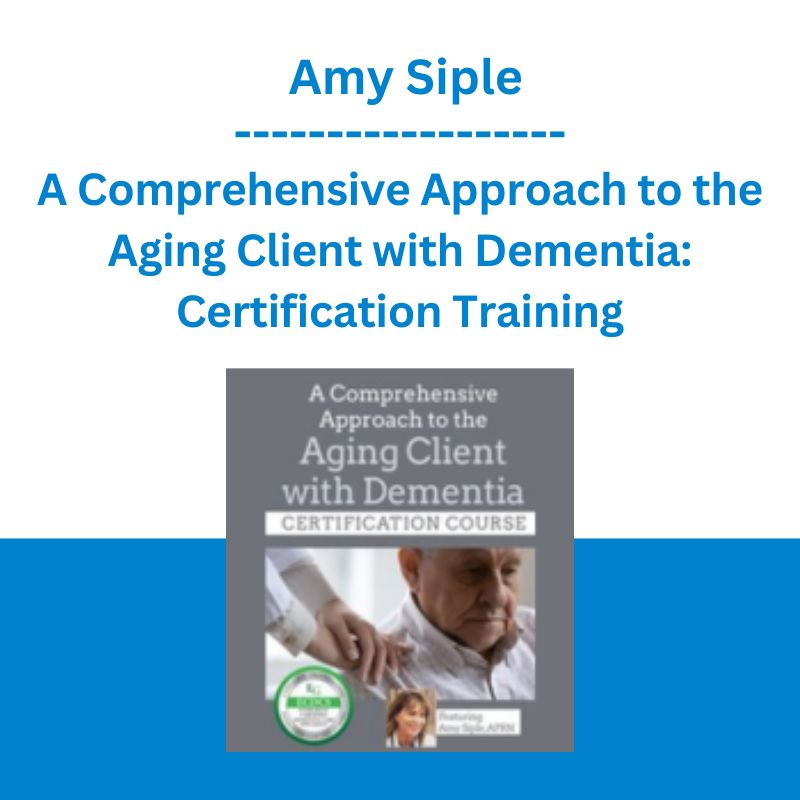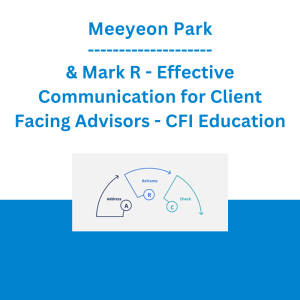*** Proof of Product ***
Exploring the Essential Features of “A Comprehensive Approach to the Aging Client with Dementia: Certification Training – Amy Siple”
Caring for the older adult with dementia is challenging. You want to provide compassionate care with a focus on dignity and quality of life while keeping your clients safe and functioning to the highest of their ability.
Most clinicians do not feel prepared to manage and anticipate the complex patient needs of a patient with dementia. It can be frustrating and leave you feeling hopeless.
Prescribing and managing medications for dementia is difficult. Your clients may be taking multiple medications, even off-label, which might make their condition worse, or be dangerous. You need to know which medications are appropriate, what side effects to watch for, and when it is time to deprescribe.
Amy Siple is excited to share with you the proven best practices for improving care for patients with dementia. She will bring her unique perspective to provide the latest evidence and management approaches. From determining clinical competence to managing medications, she will provide an extensive overview of best practices.
Real patient stories will be shared to reinforce important practices that you can immediately apply to help your patients and benefit your own practice.
Register today! You will leave equipped with new clinical insights and critical thinking skills so that you won’t need to feel uncertain anymore!
Best of all, in just three easy steps, you will become an Evergreen Certified Dementia Care Specialist (ECDCS):
Step 1: Watch the online course
Step 2: Complete the CE test(s) and instantly print your completion certificate(s).
Step 3: Submit the Certification Questionnaire included in this training, and your application is complete.*
That’s it! No hidden fees. No catch. Just certification made EASY.
Speaker
Amy Siple, APRN
Amy Siple, APRN, is a national speaker on healthcare issues that impact older adults and the empowerment of healthcare givers. She has been serving the primary care needs of residents in long-term care as a nurse practitioner for over 25 years. Amy has been appointed by three Kansas Governors to serve on boards and task forces to represent the needs of older adults and currently serves as chair of the Kansas Board for Adult Care Home Executives. Amy is a TEDx speaker and a content expert for Project Echo. Under her leadership as president of the Kansas Advanced Practice Nurses Association, Kansas became the 26th state to pass full practice authority for APRNs in 2022. She was given the AANP state award for excellence in 2023. Amy is a certified John Maxwell leadership speaker, coach, and trainer. In 2024 Amy was given the Healthcare Hero Award by the Wichita Business Journal.
Amy’s recent article The ABCD Approach for Managing Neuropsychiatric Symptoms of Dementia was published in the August issue of Nursing.It is available for free at: The ABCD approach for managing neuropsychiatric symptoms of dementia – PMC (nih.gov)
Speaker Disclosures:
Financial: Amy Siple has an employment relationship with Wichita Medical Associates. She receives a speaking honorarium and recording royalties from PESI, Inc. She has no relevant financial relationships with ineligible organizations.
Non-financial: Amy Siple is a member of the American Academy of Nurse Practitioners and the Geriatric Advanced Practice Nurses Association.
Objectives
- Identify at least two essential elements in the clinical evaluation of Dementia.
- Recall at least two cognitive assessment tools.
- Identify at least one action item when driving safety is of concern in an older adult.
- Determine the purpose of dementia care planning.
- Evaluate at least two cognitive assessment tools for the client with dementia.
- Differentiate between realistic and unrealistic goals for clients with dementia.
- Implement at least three non-pharmacologic interventions.
- Determine the role of acetylcholinesterase inhibitors and NMDA receptor antagonist.
- Determine at least two common triggers of dementia related neuropsychiatric symptoms.
- Analyze at least two pharmacologic drug classes often used to dementia related agitation.
- Determine at least two considerations when using pharmacologic agents to manage agitation in the client with dementia.
- Offer at least two non-pharmacologic interventions to reduce agitation in clients with dementia.
- Determine at least three risk factors of antipsychotics.
- Analyze at least two regulatory considerations when using antipsychotics.
- Propose at least three actionable steps that can be used to promote antipsychotic stewardship.
Outline
The Aging Client: Process for Determining Clinical Competency
- Ages and increased risks for diseases including dementia
- Why screen for clinical competency
- Clinical evaluation of dementia
- Common cognitive assessment tools
- Common dementia profiles
- Driving considerations
Developing a Dementia Care Plan
- Assessment tools that could be utilized
- Realistic goals
- Meaningful interventions
- Pharmacologic approaches
- Non-pharmacologic approaches
Managing Dementia-Related Neuropsychiatric Symptoms
- Common neuropsychiatric symptoms associated with dementia
- Common pharmacologic agents used to treat these symptoms
- Tips for de-escalating someone with agitation
- Strategies to engage clients with dementia
Antipsychotic Stewardship
- Risks associated with antipsychotic usage in older adults
- Misappropriate for behavioral and psychological symptoms associated with dementia
- CMS regulatory requirements for clients in long term care
- Choosing an appropriate antipsychotic
- Practical tips to employ antipsychotic stewardship
- Specific antipsychotics safety profiles
Target Audience
• Credentialed Health Care Professionals such as Certified Nursing Assistants, Licensed Practical Nurses, Registered Nurses, Nurse Practitioners, Physicians and Physician Assistants
• Licensed Rehabilitation Professionals such as Occupational Therapists/Occupational Therapy Assistants, Physical Therapists/Physical Therapist Assistants, Speech Language Pathologists
• Licensed Behavioral Health Professionals such as Social Workers, Marriage & Family Therapists, Psychologists and Counselors
• Other Credentialed Professionals such as Case Managers, Personal Care Assistants, Home Care Providers, Admissions Directors, Administrators
Please see the full list of alternative group-buy courses available here: https://lunacourse.com/shop/










 Don Pendleton - Dixie Convoy (The Executioner Book 27) (Kindle)
Don Pendleton - Dixie Convoy (The Executioner Book 27) (Kindle)  Don Fishback - Profit Power Seminar
Don Fishback - Profit Power Seminar  Meeyeon Park & Mark R - Effective Communication for Client Facing Advisors - CFI Education
Meeyeon Park & Mark R - Effective Communication for Client Facing Advisors - CFI Education